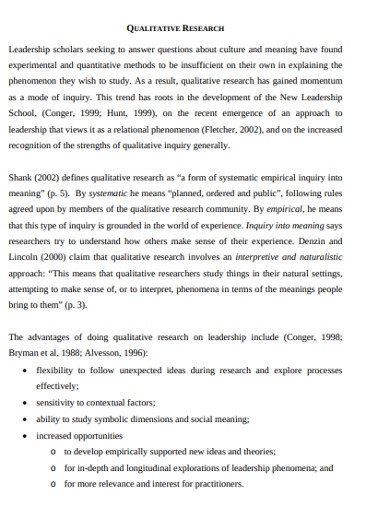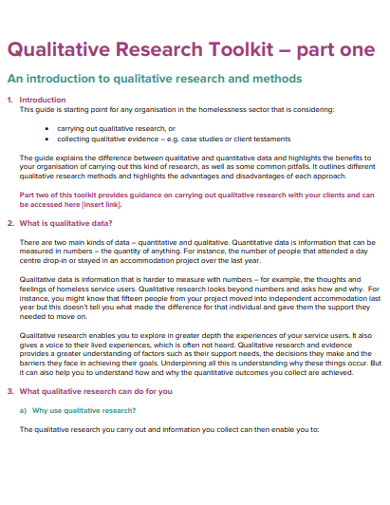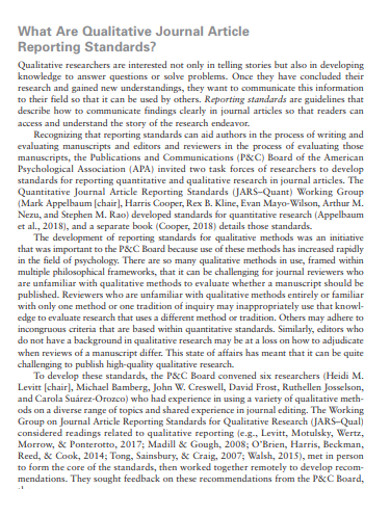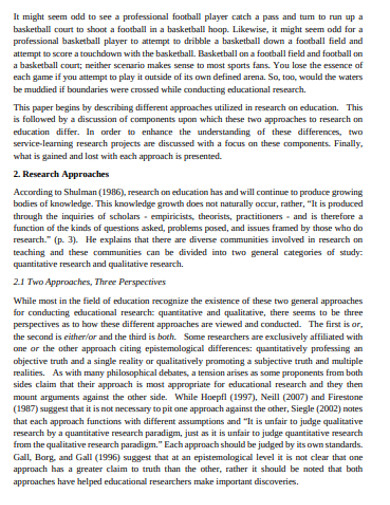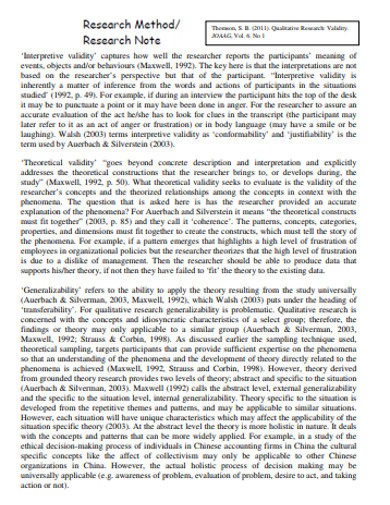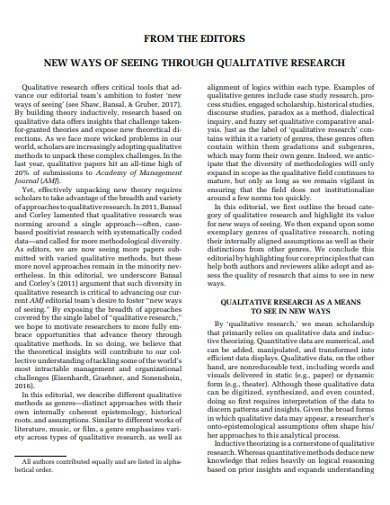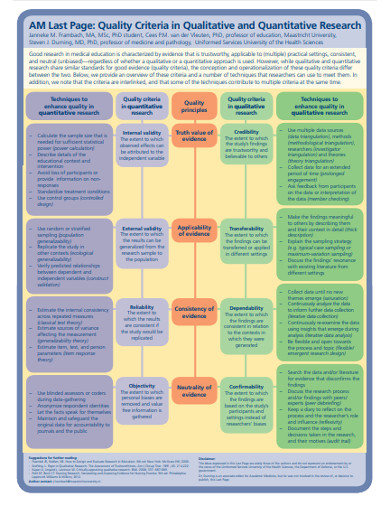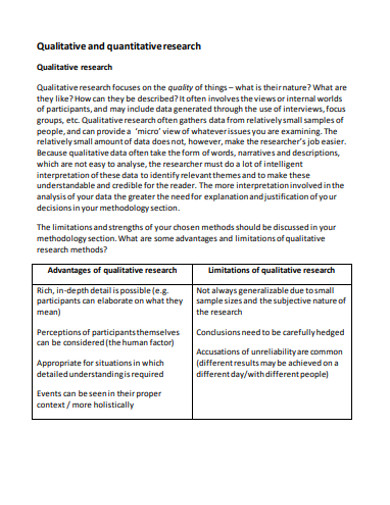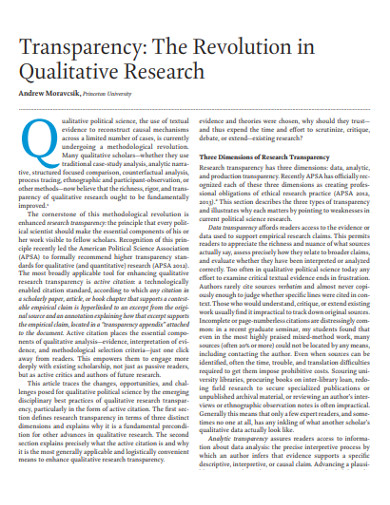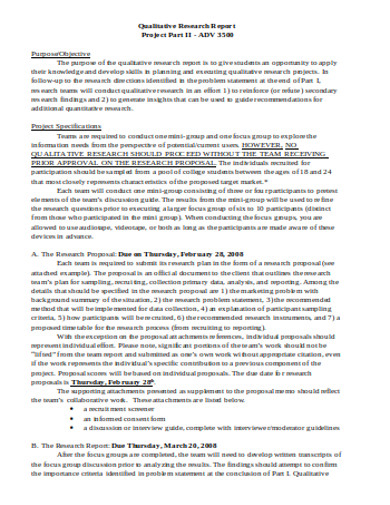12+ Qualitative Research Examples to Download
The world is full of unanswered questions. As curious beings, humans seek to find answers to every little problem they have about the universe. But some issues can’t be answered by a numerical response. There are things in life that can’t be solved by numbers. As much as people rely on metrics, some questions are only answerable by facts and objective statements, and sometimes all it takes is a yes or no. as important as numbers are, they are not always the needed reply to a question. There will be times when the right thing to say is a concrete example or even an abstract idea.
When things require a qualitative answer, the best thing for the job is qualitative research. This research focuses on understanding an inquiry through a humanistic approach. Mainly used in social sciences, this research also has been found useful in the fields of marketing, psychology, nursing, and education. This research gives light on the connection between certain variables. This research methodology is pointed towards the what and why questions. Qualitative research in psychology is used to find factual answers. This strategy delves into different types of data gathering procedures rather than relying on a single source of data.
Pros and Cons
Like any method of research, the qualitative analysis also has its own set of ups and downs. Knowing and understanding these assets and liabilities can help you decide if this research plan is the one for you. Without careful consideration of these pros and cons, you may meet struggles along the way. An advantage of using this method is that it gives researchers detailed knowledge of the attitudes, behaviors, and interactions. This kind of information makes it easier for researchers to analyze the influence of social constructs on people’s daily lives. This project case study is also very flexible and can adapt to any change in research environments at a low cost. A downside to this method, though, is that it only has a minimal scope. Researchers also have to be careful not to have any personal bias that may change or influence the results of the study.
12+ Qualitative Research Examples
If you are in the field of social science, marketing, education, or psychology, you need a research project design that suits you. A research method that can work well with you is qualitative research. The qualitative research approach reveals the correlations of actions that are usually measured by quantitative analysis. To help you gain a more in-depth understanding of the research method, here are 10+ qualitative research examples you should look into.
1. Qualitative Research Proposal Gantt Chart Template
2. Qualitative Researcher Resume Template
3. Sample Qualitative Research Example
4. Qualitative Research in Public Health Example
5. Qualitative Research Toolkit Example
6. Qualitative Research in Psychology Example
7. Education Qualitative Research Example
8. Basic Qualitative Validity Research Example
9. Qualitative Editors Research Example
10. Quality Criteria in Qualitative Research Example
11. Formal Qualitative and Quantitative Research Example
12. Revolution in Qualitative Research Example
13. Qualitative Research Report in DOC
A Mix of Methods
As established, qualitative research is very flexible. Case studies using this method can utilize various techniques to gather qualitative data. Qualitative research methodologies are as standard as you might think. Although they are considered generic, this does not mean that they are done with mediocrity. Researchers still need to be knowledgeable about the basics to create a comprehensive research report. To help you master qualitative research, here are a few methods you can use.
Direct Observation
Sometimes the best way to observe a variable is at a distance. Making contact with a variable may cause inconsistencies with the results of the study. As a researcher, you need to make use of your sense of sight, hearing, and smell. This method is usually unbeknownst to the ones being studied. Direct observation takes place in a public place where privacy is absent. your observation report is then analyzed for further investigation.
Open-Ended Survey
Survey questionnaires mostly collect numerical data. This is to formulate statistics about a certain demographic. But some surveys ask open questions to gather qualitative data. Qualitative research can use this method not only to answer the “what” questions but also the “whys.” An example is asking why you think a brand is useful and not asking which brand a buyer assumes is effective.
Focus Group
If you think you can’t handle the entirety of a group of people, you can study them by looking for representatives. Focus groups are trusted qualitative data management procedures. It takes about only 6-10 participants to help researchers get explanations for unanswered phenomena. This method might not be as cost-efficient as other methods, but it does get the job done. Even market research uses this method.
Interviews
Another good way to collect data for the qualitative study is through one on one conversations. Interview evaluation let a researcher get personal with a participant. Interviews give an in-depth insight into the studied topic since it makes an interviewer create some kind of relationship with the interviewee. There are many ways an interview can go. Researchers can prepare all the questions or just let the conversation unravel on its own.
Ethnographic Observation
Ethnographic observation gives the most precise and detailed information out of all qualitative research methods. This method makes the researcher get face to face with the participants. Research immerse themselves in the culture, the behaviors, and the events of their participants to gather intensive data. For the data to be reliable, the researchers need to live among his test subjects for months or even years.
Gathering real data is much more important than it seems. Knowing reasons can help so much more than just numbers. In a world of metrics and statistics, numbers shouldn’t be the only answer to your questions.





